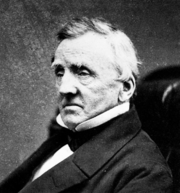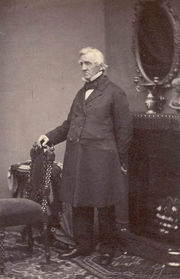
Nathaniel Bagshaw Ward
Encyclopedia

Wardian case
The Wardian case, was an early type of sealed protective container for plants, which found great use in the 19th Century in protecting foreign plants imported to Europe from overseas, the great majority of which had previously died from exposure during long sea journeys, frustrating the many...
.
Ward was born in London to Stephen Smith Ward, a medical doctor. He is believed to have been sent to Jamaica at the age of thirteen where he may have taken an interest in plants. He practised medicine in the East End of London and took an interest in botany and entomology in spare time or when on vacation in Cobham, Kent.
"What is known is that Wellclose Square, that part of dockland where he lived, was a Sherlock Holmes sort of place; not exactly producing lepers, abominable lascars and wicked Chinamen, but giving that impression all the same. And had Holmes and Watson been acquainted with their contemporary, Dr. Nathaniel Ward, undoubtedly they would have admired his scientific method of observing and deducing"
He became a Fellow of the Linnean Society in 1817.
The glass case that he used to rear butterflies and grow plants was used widely during the time for introducing plants into the British colonies. In 1833 George Loddiges
Loddiges
The Loddiges family managed one of the most notable of the eighteenth and nineteenth century plant nurseries that traded in and introduced exotic plants, trees, shrubs, ferns, palms and orchids into European gardens....
used Wardian cases for shipping plants from Australia and said that "whereas I used formerly to lose nineteen out of the twenty of the plants I imported during the voyage, nineteen out of the twenty is now the average of those that survive". Loddiges was the Vice-President of The Horticultural Society and Wardian cases became popular.

John Lindley
John Lindley FRS was an English botanist, gardener and orchidologist.-Early years:Born in Catton, near Norwich, England, John Lindley was one of four children of George and Mary Lindley. George Lindley was a nurseryman and pomologist and ran a commercial nursery garden...
in the Gardeners' Chronicle, who wrote that "when it is opened and shut from day to day, it has no more right to the name [of Wardian case] than a common greenhouse". Lindley also wrote saying that Ward had an inordinate vanity and a desire to be 'recognised [as] a second Newton'.
Dr Ward delivered a lecture on his discovery of a way to preserve plants in 1854 to the Royal Society
Royal Society
The Royal Society of London for Improving Natural Knowledge, known simply as the Royal Society, is a learned society for science, and is possibly the oldest such society in existence. Founded in November 1660, it was granted a Royal Charter by King Charles II as the "Royal Society of London"...
at the Chelsea Physic Garden
Chelsea Physic Garden
The Chelsea Physic Garden was established as the Apothecaries’ Garden in London, England in 1673. It is the second oldest botanical garden in Britain, after the University of Oxford Botanic Garden, which was founded in 1621.Its rock garden is the oldest English garden devoted to alpine plants...
. He also worked on microscopy and helped in the development of the Chelsea Physic Garden as a member of the board. He was elected a Fellow of the Royal Society in 1852.
He died at St Leonards, Sussex and is buried in an unmarked grave in West Norwood Cemetery
West Norwood Cemetery
West Norwood Cemetery is a cemetery in West Norwood in London, England. It was also known as the South Metropolitan Cemetery.One of the first private landscaped cemeteries in London, it is one of the Magnificent Seven cemeteries of London, and is a site of major historical, architectural and...

